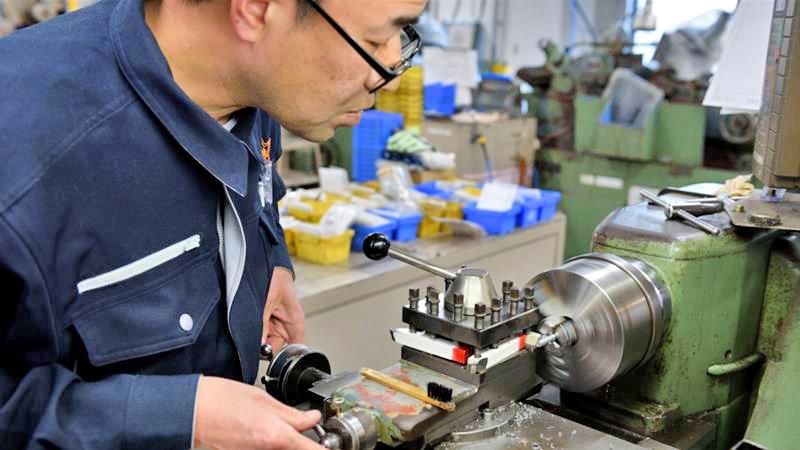
In the backdrop of the world’s largest economy, the United States, professing a trade war against China, the second-largest months before the Covid-19 outbreak, the world’s third-largest economy Japan expressed its intent on building a less-China dependent economy. Japanese premier Shinzo Abe said two weeks ago that Tokyo is eying on withdrawing its supply chains from China, following the ‘lesson’ learnt during the pandemic.
 Since February this year, amid the Covid-19 outbreak, a large number of Chinese manufacturing plants suspended operations, including supply chains for Japanese products. This severely affected the Japanese economy with a clear shortage of consumables as China is the main source of imports to Japan.
Since February this year, amid the Covid-19 outbreak, a large number of Chinese manufacturing plants suspended operations, including supply chains for Japanese products. This severely affected the Japanese economy with a clear shortage of consumables as China is the main source of imports to Japan.
Understanding the dangers of dependency, Tokyo decided to pump Yen 220 billion (US$ 2.2 billion) to support Japanese companies to move out from China and relocate factories in Japan or other regional countries, the Japanese Times reported.
Tokyo Shoko Research at the beginning of the Covid-19 outbreak in February found that 37% Japanese firms (of 2,600 respondents) are in a mission of redesigning their procurement channels to countries other than China. Besides strong GDP growth, political stability, market size and living environment, as a result of the success in facing Covid-19 so far, Vietnam has been identified as a strong candidate to attract the new flow of Japanese investments.
Even though PM Abe spoke about relocating Japanese production lines in-home and other ASEAN nations (Brunei, Cambodia, Indonesia, Laos, Malaysia, Myanmar, Philippines, Singapore, Thailand and Vietnam), such shift of the Nipponese economy has turned out to be a golden opportunity for some other south-east Asian economies with a sound manufacturing atmosphere, economists opine.
Senior Lecturer in Business Economics, University of Colombo and Invited Professor at Hosei University, Tokyo, Senior Professor H.D. Karunaratne thinks that Sri Lanka could emerge as a base for Japanese investments.
“Even before all these changes, many Japanese investments came to India, particularly to South India. But India is a big country with many diversities. In that background Sri Lanka is somewhat close to other manufacturing-based economies such as Malaysia and Thailand with a considerable economic development,” he said.
While China emerged as one of the largest investors in the Sri Lankan economy with mega projects such as Colombo Port City and Hambantota International Port management, Japan is way ahead of the game of investing in infrastructure projects in Southeast Asia, according to a recent Fitch Solutions survey. The combined value of Japanese investment in Indonesia, Malaysia, Philippines, Singapore, Thailand and Vietnam is to the tune of US$ 367 billion whereas Chinese investment is US$ 255 billion as of mid-2019.
Since the Japanese Peace Treaty was signed in 1952 in San Francisco, USA, Japan and Sri Lanka have been close friends.
By the time both counties were the two key drivers of the economic prosperity of the Asian region. This close friendship was one reason for Japan to eye on Sri Lanka as one of their first choices for an offshore investment hub when Japan is experiencing a rapid industrialisation phase. But the 30-year brutal war against terrorism changed everything.
Prof. Karunaratne suggests that Sri Lanka should conduct a quick study to identify Japanese firms which are to be relocated, to attract them here. Second, he proposes an advisory board to determine the kind of businesses Sri Lanka should set up to attract foreign investors.
“This board can carry out global mapping to pre-determine our business environment. In other words, you have to move while watching other players in the world,” he said.
Institutional failure, system failure and inconsistency of policies are three areas, where Prof. Karunaratne thinks, Sri Lanka lacks in terms of attracting Japanese investments or any FDI for that matter.
“I can give you a good example. One of my good friends in Japan started an eco-friendly hotel project in Sri Lanka under BOI approval. When he tried to get the power supply after constructing the hotel, the Electricity Board refused claiming that the hotel is situated miles from the main power supply line.
This clearly shows the inability and incompetence of the BOI to look into all aspects of an investment project. When such things happen, investors get tired, and leave the country,” the Professor said.
“This is not because Sri Lanka lacks resources but due to the absence of proper systems in the country,” he added.
While Japan is proactive about the future vulnerability of its strong economy and deciding to move out from China with the ‘lesson’ learnt, would Sri Lanka also be vigilant about these global dynamics to yield best results? That is likely to be the million-dollar question in terms of the national economy in the post-COVID ecosphere.
